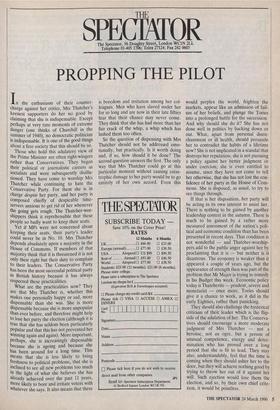SPECTAT THE
OR
The Spectator, 56 Doughty Street, London WC1N 2LL Telephone 01-405 1706; Telex 27124; Fax 242 0603
PROPPING THE PILOT
In the enthusiasm of their counter- charge against her critics, Mrs Thatcher's keenest supporters do her no good by claiming that she is indispensable. Except perhaps at very rare moments of extreme danger (one thinks of Churchill in the summer of 1940), no democratic politician is indispensable. It is one of the good things about a free society that this should be so.
Those who hold this adulatory view of the Prime Minister are often right-wingers rather than Conservatives. They began their political or journalistic careers as socialists and were subsequently disillu- sioned. They have come to worship Mrs Thatcher while continuing to hate the Conservative Party. For them she is in charge despite her party, and her party is composed chiefly of despicable time- servers anxious to get rid of her whenever the going gets rough. The Thatcher-wor- shippers think it reprehensible that these People so badly want to keep their seats. Yet if MPs were not concerned about keeping their seats, their party's leader could never be in No. 10. Mrs Thatcher depends absolutely upon a majority in the House of Commons. If members of that majority think that it is threatened it is not only their right but their duty to complain to their leaders. The Conservative Party has been the most successful political party In British history because it has always respected these practicalities.
What are the practicalities now? They are that Mrs Thatcher is, whether this makes one personally happy or sad, more dispensable than she was. She is more dispensable because she is more unpopular than ever before, and therefore might help to lose her party the election (although it is true that she has seldom been particularly Popular and that this has not prevented her winning again and again). More important, perhaps, she is increasingly dispensable because she is ageing and because she has been around for a long time. This means that she is less likely to bring freshness to political problems, that she is inclined to see all new problems too much in the light of what she believes she has already achieved over the past 11 years, more likely to bore and irritate voters with Whatever she says. It also means that there
is boredom and irritation among her col- leagues. Men who have slaved under her for so long and are now in their late fifties fear that their chance may never come. They think that she has had more than her fair crack of the whip, a whip which has lashed them too often.
So the question of dispensing with Mrs Thatcher should not be addressed emo- tionally, but practically. Is it worth doing and, if so, how should it be done? The second question answers the first. The only way that Mrs Thatcher could go at this particular moment without causing catas- trophic damage to her party would be to go entirely of her own accord. Even this would perplex the world, frighten the markets, appear like an admission of fail- ure of her beliefs, and plunge the Tories into a prolonged battle for the succession. And why should she do it? She has not done well in politics by backing down or out. What, apart from personal disen- chantment or ill health, should persuade her to contradict the habits of a lifetime now? She is not implicated in a scandal that destroys her reputation; she is not pursuing a policy against her better judgment or under coercion; she is even entitled to assume, since they have not come to tell her otherwise, that she has not lost the con- fidence of her party in the House of Com- mons. She is disposed, as usual, to try to see things through.
If that is her disposition, her party will be acting in its own interest to assist her. There is nothing to be gained by another leadership contest in the autumn. There is much to be gained by a rather more measured assessment of the nation's poli- tical and economic condition than has been presented in recent days. That condition is not wonderful — and Thatcher-worship- pers add to the public anger against her by proclaiming that it is — but neither is it disastrous. The economy is weaker than it appeared a couple of years ago, but the appearance of strength then was part of the problem that Mr Major is trying to remedy in his Budget this week. Economic policy today is Thatcherite — prudent, severe and monetarist — once more. Tories should give it a chance to work, as it did in the early Eighties, rather than panicking.
They should also challenge the hysterical criticism of their leader which is the flip- side of the adulation of her. The Conserva- tives should encourage a more moderate judgment of Mrs Thatcher — not a heroine, not an ogre, but a person of unusual competence, energy and deter- mination who has proved over a long period that she is fit to lead. They may also, understandably, feel that the time is coming when they should usher her to the door, but they will achieve nothing good by trying to throw her out of it against her will. Such ejection would lose them the election, and so, by their own chief crite- rion, it would be pointless.


















































 Previous page
Previous page